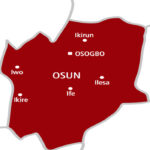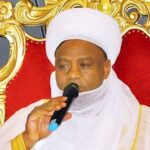Prince Tajudeen Olusi, 86, is the son of a late Oba of Lagos, King Sanusi Olusi. He does not only wear a royal crown, he is also a political leader in the state and the Chairman of the Governance Advisory Council (GAC) regarded as the elders’ council of the ruling All Progressives Congress (APC). In this interview, the prince, who lived most of his childhood life in the palace, bares his mind on the seemingly unending confrontations between the political leaders and the traditional institution.
What do you think is responsible for the confrontations between the political leaders and the traditional institution?
The crisis or sometime the conflict between the traditional institution and the present form of government is a conflict between the established institutions of democracy. When you talk of traditional institution, this is an institution established centuries ago. Then, it formed the government – the Obas, the Obis, the Emirs – were the heads of various traditional, sometime customary governments inherited from our forefathers. So, the establishment of democracy removed governmental powers from the Obas, the Obis, the Emirs and subjected them to the rulership or the headship of the modern established form of government.
You have the federal government and you have the institutions – the president, the ministers, the commissioners and the permanent secretaries, etc, who have their roles stipulated in the Constitution, but the traditional rulers are not part of government institutions.
So, it is a struggle; they have taken power completely from the traditional institution. And you would notice that from the colonial government, the Obas had been subjected to the rule of commissioners or the state officers, and you would remember that a number of Obas were deposed. The Oba of Benin was removed during the colonial period, the Awujale was removed; the Eleko of Lagos (Oba of Lagos) was removed; a number of them were removed across Nigeria. Therefore, it is a conflict that has been there for at least over a century.
What we are having now is a conflict between the established democratic institution and the old institution (traditional) that is tolerated. They have no established power, according to the laws of our country, they are only mentioned in the Constitution, maybe as council of traditional rulers as we have in each state. But you cannot find in the Constitution where their functions were defined. Therefore, it is a conflict that we established ourselves.
What is the solution?
It is for Nigerians to look at what we can do; if we want to preserve the past. This can be preserved in such a way that the occupants of the various traditional seats would know that they are only a miniature of the past since they have no powers.
You see, if we want to preserve the past, we can preserve it and assign them certain functions. For example, in the past, we had Obas and Emirs presiding over customary courts. You can still assign such functions to them, customary, traditional matters, these are still part of us. So, they can operate in those areas.
We want to preserve our customs, we want to preserve certain things in the area of tourism, these are areas that the Obas, the chiefs are still useful and they can be made to be functional. But Nigerians need to sit down and review the whole thing.
What about the power of discipline?
On the power of discipline, the issue here is that can they be subjected to disciplinary measures? Certainly, there should be a machinery, but such machinery could be one that is made up of citizens, not governors. The alternative is to leave the matter to the court to decide. These are the areas where we can remove some of the conflicts and preserve the institution.
But it appears as though the respect hitherto enjoyed by the traditional rulers is no longer there, what do you think is responsible for this?
We are advancing as a nation, as a people and in the process of advancing some people do not agree with some things done with the past. And if those who do not agree with the past are in majority, there is nothing we can do. These are some of the problems we are experiencing. Now, you look at it, in the ancient past, there were very few Obas. Today, you probably have in every local government, like 10 or 20. So, when you have more than the usual number, it cheapens it. People begin to query them, people begin to evaluate. These are part of the problem that we have now. Chiefs are competing with councillors in the local governments. Recently, I saw a video of 50 Obas gathered together and dancing.
In those days, people talked of the Eleko in Lagos, people talked of the Awujale in Ijebu Ode, people talked of the Ewi of Ado Ekiti and so on. There needs to be a redefinition of local heads and kings, who in the ancient past, some of them had empires. The position of Awujale in the history of Ijebu is not in doubt, you go to Ibadan, the position of Olubadan is not in doubt, the position of the Oba of Lagos is not in doubt, but today they are all called Obas and they are all called His Majesty. So, a number of things need to be reviewed if we want to preserve Obaship, as it was before I was born. In the House of Representatives, we have over 300 members, that is democracy. They are representing the people, they do not claim any tradition, they do not talk of any particular history or territory, they agree that they are Nigerians and they are representing the people in the legislature and their role has been defined in the constitution. If they go beyond that, any citizen can take them to court and call them to order. But that is not the case with the traditional institution.
Most Nigerians are not interested in the preservation of the traditional institution. Those who are interested in the institution are mostly people like me because of our birth. We pride ourselves, calling ourselves princes and we look back and say we are descendants of so, so, so kings, but majority of Nigerians are not interested in that.
And in reviewing our law, some people have called for removal of power to depose the traditional rulers from the governors, what is your take on that?
On deposition, I earlier mentioned a number of native rulers that were deposed during the colonial government. What I want to bring out is that deposition is not new. You would remember that there was a time in the history of the Egbas in Abeokuta, when the Alake, Oba Oladapo Ademola 11, was forced into exile as a result of a protest led by late Ransome Kuti. That shows that the power of the king is not absolute. The citizens have a right to request for a change or to request for a disciplinary measure. And if you go into the history of Oyo Empire, you would remember that a number of Alaafins were removed by the Bashorn, who was the head of the chiefs and then there is something in Yoruba practice, where they would ask the king to open the calabash. When they are tired of a ruler, the king would summon a meeting with him and tell him to go and open the calabash. By doing so, they have asked him to go and punish himself by opening the calabash that contains some poisonous gas. What I am trying to say is that disciplinary measures in respect of our Obas, Emirs and Obis had been in existence even in the past, but the issue that we have now is different. In each state, you have kingmakers, you have a number of chiefs who have a say in the appointment and deposition of chiefs. If they are honest, if they are truthful in their roles, in their advice, the administration would be good. So we cannot take the issue of deposition in isolation. You see the powers of governors are entrenched in the law but many times the chiefs also have a role to play. Before an Oba is appointed, the kingmakers who are the traditional customary chiefs of that particular area would make a recommendation, at times they adopt the choice of the governor against the wish of the majority of the citizens. So in that case, the fault is not that of the governor, but the chiefs who have a responsibility to do what is right.
Let me tell you also, as citizens, we have a right to challenge the decision of the governors and matters are taken to court and there have been a number of times when the courts ruled against the governors. So, we have to look at the problem fairly.
Do you think ordinary Nigerians give due respect to the institution, all that you read in the papers are just spurs of the moment. Do Nigerians really accept the institution?
A number of our people have complaints against the institution, maybe in respect of family property, maybe in respect of land matters, maybe in respect of communal land, etc. Because of all these, a number of them are not bothered whether the kings are treated fairly by the governors or not because they have grievances against them.

 Join Daily Trust WhatsApp Community For Quick Access To News and Happenings Around You.
Join Daily Trust WhatsApp Community For Quick Access To News and Happenings Around You.


